Black Pepper transports diners to the seductive location of Italy, recreating the space and cuisine essential for a romantic evening.
Taiwan has its own unique way of recreating Italian classics. Other than a surprisingly good 7-Eleven rendition of a spaghetti bolognese, local pasta offerings can lean more curious than creative.
In my search for authentic Italian, Instagram guides me to this hip hotspot, which strikes a balance between bistro and bar, romantic and chill, and price wise sitting comfortably between get-what-you-pay-for, faux-Italian and a Michelin once-a-year affair.
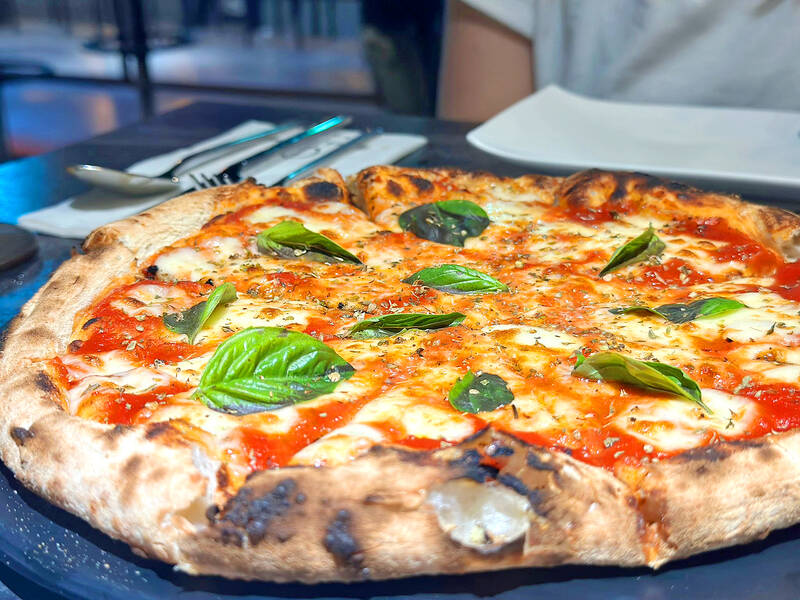
Photo: Hollie Younger
My Saturday night reservation at 8pm feels positively early as a steady chain of model-esque types stream in all night for a Limoncello Spritz, Italians gesture over clinking glasses (always a good sign) and dates enjoy bottles of bubbly chilled tableside.
Reviews intrigue with promises of must-try chef specials, award-winning calzones and, apparently, gorgeous Italian owners.
Gianluca Marraffa and Luca Botta deliver on all three, hailing from Sicily and Turin respectively. And much of what goes into their dishes — cheese, tomatoes, artichokes, olive oil, flour — is imported straight from the heartland.
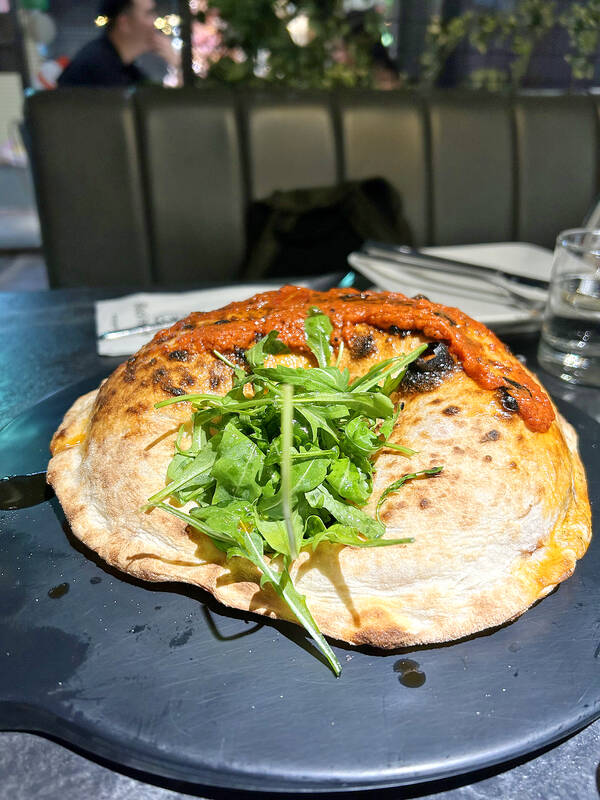
Photo: Hollie Younger
The appetizer sets the tone: premium produce, classy presentation and refinement without reinvention. This is the burrata mozzarella (NT$520). Flown in directly from Italy every two weeks, Taipei surely cannot offer better than this.
Our pert little ball of burrata sits pretty atop a moat of Mediterranean vegetables, pink pickled onions and delightful little nuggets of fried pizza dough. Slice in and you’ll see this is the real deal; creamy and luxuriant with that naughty indulgence one only gets from eating an entire ball of cheese and calling it a starter.
All eyes are on the open kitchen, where Botta flings discs of dough in the air, the seductive scent of blistering pizza crusts wafting as he pulls a conveyor belt of fresh pies from the glowing pizza oven. It would feel rude not to order one — or two.
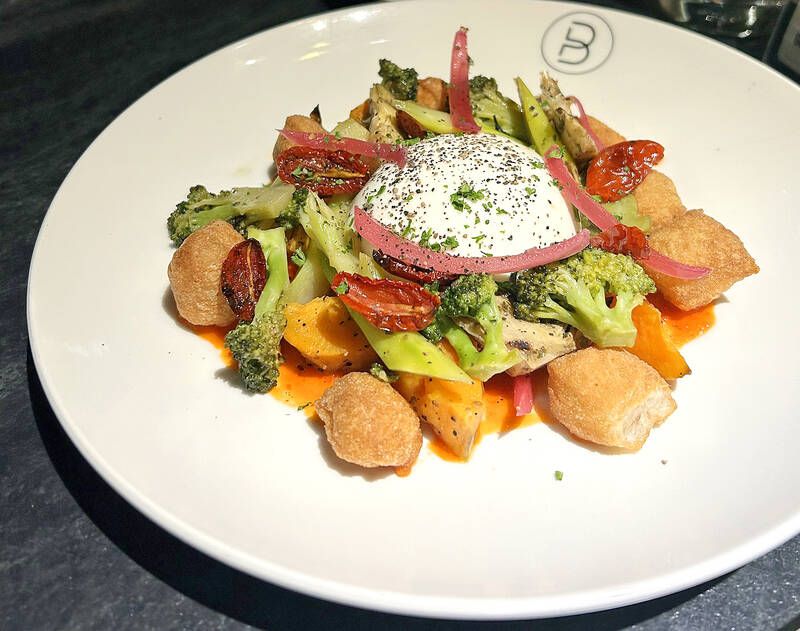
Photo: Hollie Younger
The signature here is the calzone (NT$440); an entire pizza folded like a fortune cookie, filled with creamy mozzarella, cuts of ham and hidden chunks of mushroom, offering a different textural experience as toppings become fillings and steam inside the oven.
But the margherita pizza (NT$320) is the showstopper. Speckled leopard spotted crusts, chewy base and perfectly oozy cheese; this takes us straight to a balmy evening in the Adriatic.
The chef’s specials change every few days or until sold out, keeping regulars coming back for more inventive creations like this particular evening’s homemade gnocchi dish (NT$520) with artichokes, sundried tomatoes and squid slathered in a pistachio lime sauce, sprinkled with crumbled pistachio chunks. Nutty and savory, pistachio proves its place on the dinner table, elevated beyond the humble ice cream.
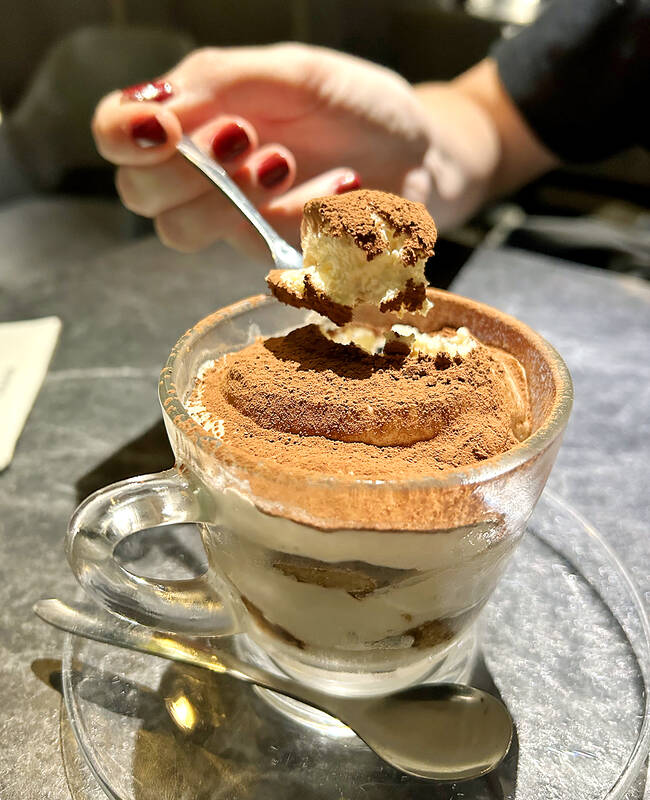
Photo: Hollie Younger
I would recommend sharing everything family-style; portions are generous and the dishes can be quite rich and complex.
We finish the evening with a sleek cup of tiramisu (NT$220); a viral flavor I’ve seen popping up a lot lately, from night market pancakes to up-scale latte offerings. But this is the real deal. The cream atop is light enough to polish off tonight’s carb-fest and the coffee-soaked cake below receives the highest compliment to be bestowed upon a dessert in Taiwan: “not too sweet”.
Black Pepper can shake up near on any classic cocktail from the martinis to the mojitos, but we stick strictly Italian once I spot local liqueur limoncello on the menu, like gold dust this far from home. We opt for a refreshing Limoncello Spritz (NT$320) and a Coconut Limoncello (NT$350), the lemony pina colada we never knew we needed.
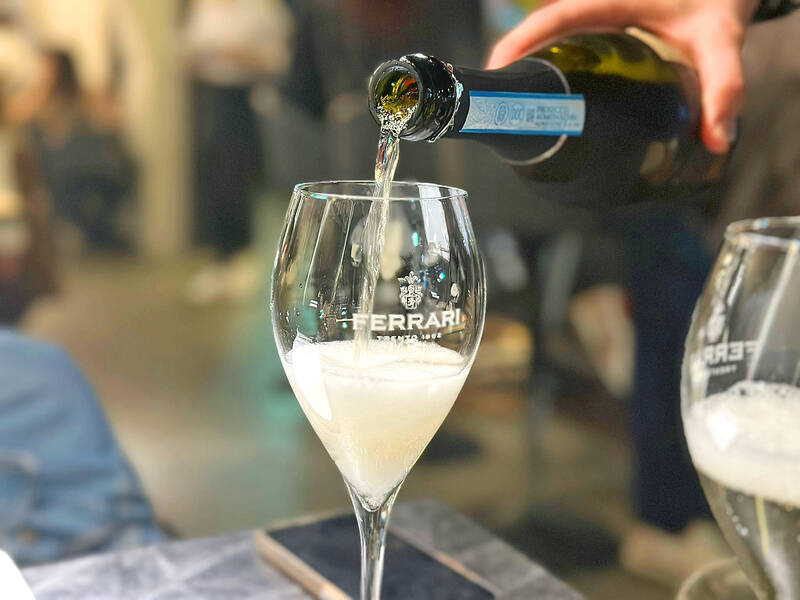
Photo: Hollie Younger
Black Pepper gets it just right for a late-night date night or an after-work treat with friends, at once upscale and exclusive, yet accessible price-wise and inviting with its warm vibe and exceptional Italian hospitality.
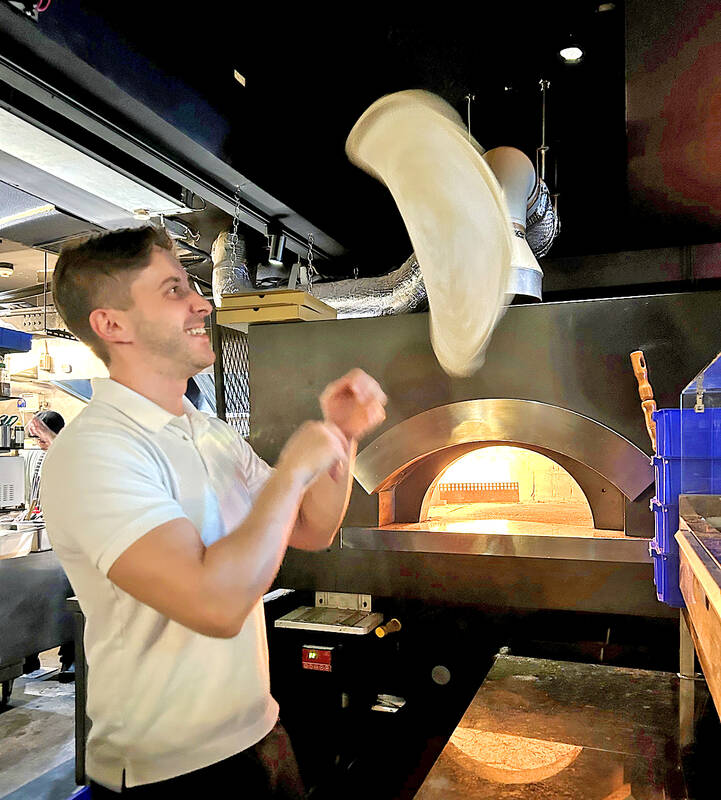
Photo: Hollie Younger

In the next few months tough decisions will need to be made by the Taiwan People’s Party (TPP) and their pan-blue allies in the Chinese Nationalist Party (KMT). It will reveal just how real their alliance is with actual power at stake. Party founder Ko Wen-je (柯文哲) faced these tough questions, which we explored in part one of this series, “Ko Wen-je, the KMT’s prickly ally,” (Aug. 16, page 12). Ko was open to cooperation, but on his terms. He openly fretted about being “swallowed up” by the KMT, and was keenly aware of the experience of the People’s First Party

Aug. 25 to Aug. 31 Although Mr. Lin (林) had been married to his Japanese wife for a decade, their union was never legally recognized — and even their daughter was officially deemed illegitimate. During the first half of Japanese rule in Taiwan, only marriages between Japanese men and Taiwanese women were valid, unless the Taiwanese husband formally joined a Japanese household. In 1920, Lin took his frustrations directly to the Ministry of Home Affairs: “Since Japan took possession of Taiwan, we have obeyed the government’s directives and committed ourselves to breaking old Qing-era customs. Yet ... our marriages remain unrecognized,

During the Metal Ages, prior to the arrival of the Dutch and Chinese, a great shift took place in indigenous material culture. Glass and agate beads, introduced after 400BC, completely replaced Taiwanese nephrite (jade) as the ornamental materials of choice, anthropologist Liu Jiun-Yu (劉俊昱) of the University of Washington wrote in a 2023 article. He added of the island’s modern indigenous peoples: “They are the descendants of prehistoric Formosans but have no nephrite-using cultures.” Moderns squint at that dynamic era of trade and cultural change through the mutually supporting lenses of later settler-colonialism and imperial power, which treated the indigenous as

Standing on top of a small mountain, Kim Seung-ho gazes out over an expanse of paddy fields glowing in their autumn gold, the ripening grains swaying gently in the wind. In the distance, North Korea stretches beyond the horizon. “It’s so peaceful,” says the director of the DMZ Ecology Research Institute. “Over there, it used to be an artillery range, but since they stopped firing, the nature has become so beautiful.” The land before him is the demilitarized zone, or DMZ, a strip of land that runs across the Korean peninsula, dividing North and South Korea roughly along the 38th parallel north. This